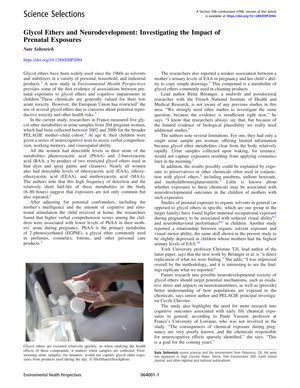Glycol Ethers and Neurodevelopment: Investigating the Impact of Prenatal Exposures
June 2017
in “
Environmental health perspectives
”

TLDR Exposure to certain glycol ethers during pregnancy may be linked to lower verbal comprehension in children.
The document reports on a study that investigated the association between prenatal exposure to glycol ethers and neurocognitive development in children. Researchers measured five glycol ether metabolites in the urine of 204 pregnant women from the PELAGIE mother-child cohort in France, with samples collected between 2002 and 2006. At age 6, the children underwent neurocognitive tests. The study found that higher verbal comprehension scores in children were associated with lower levels of the metabolite phenoxyacetic acid (PhAA) in their mothers' urine during pregnancy. PhAA is a metabolite of 2-phenoxyethanol, a glycol ether used in personal care products. A weaker association was found between a mother's urinary levels of ethoxyacetic acid (EAA) during pregnancy and her child's ability to copy simple drawings, a compound commonly found in cleaning products. The study's limitations include having only a single urine sample per woman and the possibility that other chemicals used with glycol ethers could explain the results. The findings suggest a need for further research into the neurodevelopmental toxicity of glycol ethers and the broader impact of chemical exposures during pregnancy on cognitive outcomes in children.